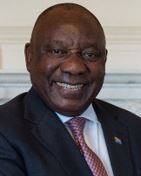Cyril Ramaphosa Re-elected for 2nd Term as South African President After New ANC-DA Agreement

Cyril Ramaphosa has been re-elected as the President of South Africa for a second term after African National Congress concluded a just-in-time agreement with political opposition law makers. African National Congress (ANC), in power since 1994, for the first time in history, lost majority and needed to negotiate a “not so easily earned” support from opposition law makers. Mr Ramaphosa received 283 votes to Mr Malema’s 44 in the 400-member house.
During a parliamentary ballot session, the opposition party Democratic Alliance (DA) supported Cyril Ramaphosa, ensuring his re-election for a second term. Several other political parties also backed the deal. As part of the power-sharing agreement, an ANC representative secured the position of Speaker of the National Assembly, while a DA representative became the Deputy Speaker, illustrating the cooperation between the two parties.
Despite often criticizing the ANC’s governance and policies, particularly on foreign affairs like South Africa’s stance on Palestine, the DA’s support marks a significant political collaboration. Observers are keen to see how cabinet ministries will be distributed and how successfully the differing ideologies of the ANC and DA will blend.
Some parties, including Julius Malema’s Economic Freedom Fighters (EFF), chose not to join the power-sharing agreement. For Ramaphosa and the ANC, it’s crucial to reflect on why they lost their majority, especially given their dominant presence since the end of apartheid in 1994. Addressing allegations of corruption and working to reduce crime and poverty are vital steps.
The ideological gap between the ANC and DA could present governance challenges, given the DA’s strong criticism of ANC’s methods. However, this new collaboration could lead to a significant shift in South African politics.
“New birth, a new era for our country”. – Cyril Ramaphosa, President, South Africa
“From today, the DA will co-govern the Republic of South Africa in a spirit of unity and collaboration,”– John Steenhuisen, DA Leader
Foreign Affairs Issues for the Coalition:
Israel-Palestine Conflict:
The African National Congress (ANC), South Africa’s ruling party, recently brought a case against Israel to the International Criminal Court (ICJ) concerning casualties resulting from Israeli military actions in Gaza. While this move garnered significant international acclaim, it received a tepid response domestically, particularly from the Democratic Alliance (DA), the ANC’s current coalition partner, which opposed the action. As the coalition government navigates its foreign policy, it will be intriguing to observe how the divergent stances of the ANC and DA influence South Africa’s diplomatic strategies moving forward.
The Democratic Alliance (DA) has consistently opposed the African National Congress’s (ANC) handling of Palestinian issues. The DA criticized the ANC’s decision to withdraw diplomats from Tel Aviv in response to Israeli military actions in Gaza and has opposed any plans to expel Israeli diplomats from South Africa. Advocating for the retention of diplomatic channels, the DA believes this approach allows South Africa to effectively influence regional matters. The DA has accused the ANC of political opportunism, arguing that such actions undermine healthy diplomatic engagement rather than helping constructive dialogue. This opposition underscores the significant policy divergence within the coalition government regarding Middle Eastern affairs.
The Zimbabwe (ZANU-PF) Issue:
The strong friendship between the African National Congress (ANC) and Zimbabwe’s ruling party, the Zimbabwe African National Union-Patriotic Front (ZANU-PF), creates a complex dynamic within South Africa’s coalition government. This longstanding friendship contrasts sharply with the Democratic Alliance’s (DA) staunch opposition to ZANU-PF, highlighting a significant ideological rift.
“The ANC’s invitation to ZANU-PF asking them to come and be part of their election campaign programme amounts to political interference with our elections. This compromises the Electoral Code of Conduct that all political parties swore to uphold”- DA
Stance of South Africa in Russo-Ukrainian War:
Among the key issues creating an ideological rift between the ANC and DA is South Africa’s stance on the Russo-Ukrainian War. Under ANC rule, South Africa has maintained a neutral position while increasingly leaning towards a pro-Russian approach. As a member of BRICS, South Africa has deep ties with Russia in diplomacy, business, and defense cooperation. Reflecting this neutrality, South Africa abstained from several critical UN General Assembly resolutions that called for Russia to cease its aggression against Ukraine, permit humanitarian access, and expel Russia from the UN Human Rights Council. President Ramaphosa has argued that pressure tactics may temporarily reduce hostilities but fail to achieve long-term peace, which he believes can only be secured through dialogue.
Conversely, the DA has strongly criticized the ANC’s handling of the Russo-Ukrainian conflict, accusing the ruling party of insensitivity towards genuine human rights issues caused by the Russian invasion of Ukraine and maintaining an unnecessarily pro-Russian stance. This divergence in foreign policy perspectives highlights a significant challenge for the coalition government, potentially complicating its efforts to present a unified international position.
If the ANC cared about human rights or international law, they would not have remained silent in the face of Russia’s illegal invasion of Ukraine, and the South African National Defense Force would not have been deployed to play war games with Putin’s army as the bodies continued to stack in Bakhmut. – DA
As the ANC and DA embark on this difficult coalition, the stakes are high for both parties and South Africa as a whole. Their opposed views on key issues, ranging from foreign policy to domestic governance, create a palpable anxiety about the coalition’s success and the implications. It is crucial for the ANC, DA, and other coalition partners to establish a common minimum program that takes care of their domestic and international policies. As South Africa stands at this crossroads, the success of this coalition will significantly determine the nation’s ability to address internal challenges and assert its role globally, ultimately shaping the legacy of this so called historic political alliance.
